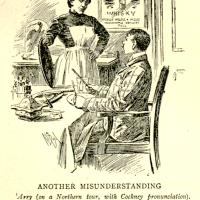 While there is humour and light and poetry in Mongomery’s prose style, I suspect that most of L.M. Montgomery’s readers are first captured by her characters. Absolutely there is Anne Shirley of Green Gables: impetuous, magical, an invitation to wild imagination. Emily Byrd Starr of New Moon is more muted but no less abandoned and imaginative. Emily doesn’t find the fairy tale adoption when she is orphaned but develops rugged individuality and mystical integrity in the face of alienation and persecution. And there are others: the slow discovery of new life in Matthew and Marilla, the stolid Mrs. Lynde, the painful encouragement of Mr. Carpenter, the Irish fairy priest Fr. Cassidy, bittersweet Walter Blythe, honest miscreant Davy, storyteller Captain Jim, and Phil Gordon who tries hard to be a thoughtless, shallow ditz but is really a person of great intelligence and substance. The characters make us laugh and cry and wonder and invite us into new imaginative spaces.
While there is humour and light and poetry in Mongomery’s prose style, I suspect that most of L.M. Montgomery’s readers are first captured by her characters. Absolutely there is Anne Shirley of Green Gables: impetuous, magical, an invitation to wild imagination. Emily Byrd Starr of New Moon is more muted but no less abandoned and imaginative. Emily doesn’t find the fairy tale adoption when she is orphaned but develops rugged individuality and mystical integrity in the face of alienation and persecution. And there are others: the slow discovery of new life in Matthew and Marilla, the stolid Mrs. Lynde, the painful encouragement of Mr. Carpenter, the Irish fairy priest Fr. Cassidy, bittersweet Walter Blythe, honest miscreant Davy, storyteller Captain Jim, and Phil Gordon who tries hard to be a thoughtless, shallow ditz but is really a person of great intelligence and substance. The characters make us laugh and cry and wonder and invite us into new imaginative spaces.
 Montgomery is also peculiarly good at creating hilarious caricatures. Often these are indulgent little portraits, typically satirical and probably a little cruel. They are most likely not people from her world that she decides to pillory in print, for, she was like Emily:
Montgomery is also peculiarly good at creating hilarious caricatures. Often these are indulgent little portraits, typically satirical and probably a little cruel. They are most likely not people from her world that she decides to pillory in print, for, she was like Emily:
Emily didn’t put any of the neighbours in–she didn’t need to. Characters galore trooped into her consciousness, demanding a local habitation and a name (Emily’s Quest, 18.III).
Still, there are these fabulous characters, often strangers that make only a single appearance but who has a whole pepper and salt her work from beginning to end. Montgomery was, after all, an episodic novelist, a consummate short-story writer, so the characters form the crisis and sometimes the resolution of the vignettes in her work.
One of my favourites, beloved for its sheer pomposity, is the picture of Mark Greaves, aka Mark D. Greaves, aka Mark Delage Greaves, author. Emily meets Greaves quite accidentally. A newspaper editor friend was in quite a fix. They were running a serial story that they grabbed from a novel in order to fill space in the paper. Unfortunately, they lost the story and had no idea how it ended. As a favour, Emily finished the story based on the editor’s brief description:
In the half-hour allotted to her Emily produced a quite respectable concluding chapter with a solution of the mystery which was really ingenious. Mr. Wilson [the editor] snatched it with an air of relief handed it to a compositor, and bowed Emily out with thanks.
 Quite by coincidence, the author of the original piece was visiting Prince Edward Island and discovered that his piece was not only pilfered by the local paper by completed by an amateur who clearly knows nothing about art. This plot twist is one that comes purely from Montgomery’s imagination, but the premise isn’t. During the winter of 1901-1902, Montgomery worked as a proof-reader for The Daily Echo in Halifax. This post gave her an opportunity to do some reporting and a bit of column writing. It also gave her the chance to finish up a serial from a “sensational novel” that was wandering on without much direction. Though Montgomery wondered in her journal what the author might have thought of this impertinence, she never had the chance to meet him. According to her journal, however, Daily Echo readers noticed that the story “wandered on, chapter after chapter for weeks and never seemed to get anywhere; and then it just finished up in eight chapters, liketty split” (Selected Journals I 281). A judicious editorial hand.
Quite by coincidence, the author of the original piece was visiting Prince Edward Island and discovered that his piece was not only pilfered by the local paper by completed by an amateur who clearly knows nothing about art. This plot twist is one that comes purely from Montgomery’s imagination, but the premise isn’t. During the winter of 1901-1902, Montgomery worked as a proof-reader for The Daily Echo in Halifax. This post gave her an opportunity to do some reporting and a bit of column writing. It also gave her the chance to finish up a serial from a “sensational novel” that was wandering on without much direction. Though Montgomery wondered in her journal what the author might have thought of this impertinence, she never had the chance to meet him. According to her journal, however, Daily Echo readers noticed that the story “wandered on, chapter after chapter for weeks and never seemed to get anywhere; and then it just finished up in eight chapters, liketty split” (Selected Journals I 281). A judicious editorial hand.
We cannot know what the author would have thought of Montgomery’s editorial work, but she gives us at least one of the alternate stories of her imagination int he character of Mark Greaves, author. The picture of the pretentious poet that follows quietly seals in Emily’s decision not to be part of the New York literary scene. But it so beautifully captures the figure of the romantic poet as it is hived between Goethe‘s Werther and the kind of poet satirized by the Annette Bening character in Running With Scissors (see below). I hope you enjoy as well as I did.
 “I wonder if any of the readers will notice where the seam comes in,” reflected Emily amusedly. “And I wonder if Mark Greaves will ever see it and if so what he will think.”
“I wonder if any of the readers will notice where the seam comes in,” reflected Emily amusedly. “And I wonder if Mark Greaves will ever see it and if so what he will think.”
It did not seem in the least likely she would ever know and she dismissed the matter from her mind. Consequently when, one afternoon two weeks later, Cousin Jimmy ushered a stranger into the sitting-room where Emily was arranging roses in Aunt Elizabeth’s rock-crystal goblet with its ruby base–a treasured heirloom of New Moon–Emily did not connect him with A Royal Betrothal, though she had a distinct impression that the caller was an exceedingly irate man.
Cousin Jimmy discreetly withdrew and Aunt Laura, who had come in to place a glass dish full of strawberry preserves on the table to cool, withdrew also, wondering a little who Emily’s odd-looking caller could be. Emily herself wondered. She remained standing by the table, a slim, gracious thing in her pale-green gown, shining like a star in the shadowy, old-fashioned room.
“Won’t you sit down?” she questioned with all the aloof courtesy of New Moon. But the newcomer did not move. He simply stood before her staring at her. And again Emily felt that, while he had been quite furious when he came in, he was not in the least angry now.
 He must have been born, of course, because he was there–but it was incredible, she thought, he could ever have been a baby. He wore audacious clothes and a monocle, screwed into one of his eyes–eyes that seemed absurdly like little black currants with black eyebrows that made right-angled triangles above them. He had a mane of black hair reaching to his shoulders, an immensely long chin and a marble-white face. In a picture Emily thought he would have looked rather handsome and romantic. But here in the New Moon sitting-room he looked merely weird.
He must have been born, of course, because he was there–but it was incredible, she thought, he could ever have been a baby. He wore audacious clothes and a monocle, screwed into one of his eyes–eyes that seemed absurdly like little black currants with black eyebrows that made right-angled triangles above them. He had a mane of black hair reaching to his shoulders, an immensely long chin and a marble-white face. In a picture Emily thought he would have looked rather handsome and romantic. But here in the New Moon sitting-room he looked merely weird.
“Lyrical creature,” he said, gazing at her.
Emily wondered if he were by any chance an escaped lunatic.
“You do not commit the crime of ugliness,” he continued fervently. “This is a wonderful moment–very wonderful. ‘Tis a pity we must spoil it by talking. Eyes of purple-grey, sprinkled with gold. Eyes that I have looked for all my life. Sweet eyes, in which I drowned myself eons ago.”
“Who are you?” said Emily crisply, now entirely convinced that he was quite mad. He laid his hand on his heart and bowed.
“Mark Greaves–Mark D. Greaves–Mark Delage Greaves.”
 Mark Greaves! Emily had a confused idea that she ought to know the name. It sounded curiously familiar.
Mark Greaves! Emily had a confused idea that she ought to know the name. It sounded curiously familiar.
“Is it possible you do not recognize my name! Verily this is fame. Even in this remote corner of the world I should have supposed–”
“Oh,” cried Emily, light suddenly breaking on her. “I–I remember now. You wrote A Royal Betrothal.”
“The story you so unfeelingly murdered–yes.”
“Oh, I’m so sorry,” Emily interrupted. “Of course you would think it unpardonable. It was this way–you see–”
He stopped her by a wave of a very long, very white hand.
“No matter. No matter. It does not interest me at all now. I admit I was very angry when I came here. I am stopping at the Derry Pond Hotel of The Dunes–ah, what a name–poetry–mystery–romance–and I saw the special edition of The Argus this morning. I was angry–had I not a right to be?–and yet more sad than angry. My story was barbarously mutilated. A happy ending. Horrible. My ending was sorrowful and artistic. A happy ending can never be artistic. I hastened to the den of The Argus. I dissembled my anger–I discovered who was responsible. I came here–to denounce–to upbraid. I remain to worship.”
Emily simply did not know what to say. New Moon traditions held no precedent for this.
“You do not understand me. You are puzzled–your bewilderment becomes you. Again I say a wonderful moment. To come enraged–and behold divinity. To realize as soon as I saw you that you were meant for me and me alone.”
 Emily wished somebody would come in. This was getting nightmarish.
Emily wished somebody would come in. This was getting nightmarish.
“It is absurd to talk so,” she said shortly. “We are strangers–”
“We are not strangers,” he interrupted. “We have loved in some other life, of course. And our love was a violent, gorgeous thing–a love of eternity. I recognized you as soon as I entered. As soon as you have recovered from your sweet surprise you will realize this, too. When can you marry me?”
To be asked by a man to marry him five minutes after the first moment you have laid eyes on him is an experience more stimulating than pleasant. Emily was annoyed.
“Don’t talk nonsense, please,” she said curtly. “I am not going to marry you at any time.”
“Not marry me? But you must! I have never before asked a woman to marry me. I am the famous Mark Greaves. I am rich. I have the charm and romance of my French mother and the common-sense of my Scotch father. With the French side of me I feel and acknowledge your beauty and mystery. With the Scotch side of me I bow in homage to your reserve and dignity. You are ideal–adorable. Many women have loved me but I loved them not. I enter this room a free man. I go out a captive. Enchanting captivity! Adorable captor! I kneel before you in spirit.”
Emily was horribly afraid he would kneel before her in the flesh. He looked quite capable of it. And suppose Aunt Elizabeth should come in.
“Please go away,” she said desperately. “I’m–I’m very busy and I can’t stop talking to you any longer. I’m sorry about the story–if you would let me explain–”
“I have said it does not matter about the story. Though you must learn never to write happy endings–never. I will teach you. I will teach you the beauty and artistry of sorrow and incompleteness. Ah, what a pupil you will be! What bliss to teach such a pupil! I kiss your hand.”
 He made a step nearer as if to seize upon it. Emily stepped backward in alarm.
He made a step nearer as if to seize upon it. Emily stepped backward in alarm.
“You must be crazy,” she exclaimed.
“Do I look crazy?” demanded Mr. Greaves.
“You do,” retorted Emily flatly and cruelly.
“Perhaps I do–probably I do. Crazy–intoxicated with wine of the rose. All lovers are mad. Divine madness! Oh, beautiful, unkissed lips!”
Emily drew herself up. This absurd interview must end. She was by now thoroughly angry.
“Mr. Greaves,” she said–and such was the power of the Murray look that Mr. Greaves realized she meant exactly what she said. “I shan’t listen to any more of this nonsense. Since you won’t let me explain about the matter of the story I bid you good-afternoon.”
Mr. Greaves looked gravely at her for a moment. Then he said solemnly:
“A kiss? Or a kick? Which?”
Was he speaking metaphorically? But whether or no–
“A kick,” said Emily disdainfully.
 Mr. Greaves suddenly seized the crystal goblet and dashed it violently against the stove.
Mr. Greaves suddenly seized the crystal goblet and dashed it violently against the stove.
Emily uttered a faint shriek–partly of real terror–partly of dismay. Aunt Elizabeth’s treasured goblet.
“That was merely a defence reaction,” said Mr. Greaves, glaring at her. “I had to do that–or kill you. Ice-maiden! Chill vestal! Cold as your northern snows! Farewell.”
He did not slam the door as he went out. He merely shut it gently and irrevocably, so that Emily might realize what she had lost. When she saw that he was really out of the garden and marching indignantly down the lane as if he were crushing something beneath his feet, she permitted herself the relief of a long breath–the first she had dared to draw since his entrance.
“I suppose,” she said, half hysterically, “that I ought to be thankful he did not throw the dish of strawberry preserves at me.”
Aunt Elizabeth came in.
“Emily, the rock-crystal goblet! Your Grandmother Murray’s goblet! And you have broken it!”
“No, really. Aunty dear, I didn’t. Mr. Greaves–Mr. Mark Delage Greaves did it. He threw it at the stove.”
“Threw it at the stove!” Aunt Elizabeth was staggered. “Why did he throw it at the stove?”
“Because I wouldn’t marry him,” said Emily.
“Marry him! Did you ever see him before?”
“Never.”
Aunt Elizabeth gathered up the fragments of the crystal goblet and went out quite speechless. There was–there must be–something wrong with a girl when a man proposed marriage to her at first meeting. And hurled heirloom goblets at inoffensive stoves (Emily’s Quest, 17.II).






















Pingback: 2018: A Year of Reading: The Nerd Bit | A Pilgrim in Narnia
Pingback: My Defiant Appreciation of the Biopic Tolkien | A Pilgrim in Narnia
Pingback: L.M. Montgomery on the Love of Trees, and Hurricane Dorian | A Pilgrim in Narnia
Pingback: Update, with Fundraiser Link: L.M. Montgomery on the Love of Trees, and Hurricane Dorian | A Pilgrim in Narnia
Pingback: 2019: A Year of Reading: The Nerd Bit, with Charts | A Pilgrim in Narnia
Pingback: L.M. Montgomery Articles on A Pilgrim In Narnia #lmmi2020 #LMMontgomery | A Pilgrim in Narnia
Pingback: 2020: A Year of Reading: The Nerd Bit, with Charts | A Pilgrim in Narnia
Pingback: “The Poetry of Lucy Maud Montgomery” and the Critical Virtue and Vice of Editors | A Pilgrim in Narnia
Pingback: John Bunyan’s Apology for his Book with a Note from C.S. Lewis on Writing as Holistic Discovery–and How Narnia Achieved the Bigness You See | A Pilgrim in Narnia
Pingback: My New Online Short Course: “Spirituality in the Writing of L.M. Montgomery” at AST in May, 2022 | A Pilgrim in Narnia